I have written several times about the Danish organization called Stop the Islamification of Denmark, or SIAD.
Denmark is way ahead of the rest of the West in grassroots organizing to counter the encroachment of sharia, and SIAD has just taken its effort a step further to include the rest of the continent: Stop the Islamification of Europe.
SIAD is carrying its message to the very heart of the EU on September 11th. Anders Gravers, the founder and leader of SIAD, recently sent me the following press release:
Demonstration outside the European Parliament
September 11th 2007
Europeans are saying
ENOUGH IS ENOUGH!
NO SHARIA HERE!
So join the call
All European nations must be represented
SO IF YOU LOVE FREEDOM
IF YOU LOVE YOUR COUNTRY
BE THERE!!
The organizers of the demonstration are:
SIAD (Denmark) sioe@siad.dk phone: +45 96771784
No Sharia Here (England) sioe.nsh@btinternet.com
We are in contact with Akte-islam in Germany, which is organizing the German participation.
We seek people/organizations from all other European countries who will organize participation by their own countrymen.
For questions or coordination amongst countries, contact SIAD or No Sharia Here.
STOP THE ISLAMIFICATION OF EUROPE
The Origin of the Group
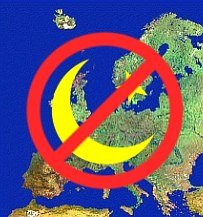 Stop the Islamification of Europe (SIOE) is an alliance of people from across Europe with the single aim of preventing Islam from becoming a dominant political force in Europe.
Stop the Islamification of Europe (SIOE) is an alliance of people from across Europe with the single aim of preventing Islam from becoming a dominant political force in Europe.
It originated with the joining of Stop Islamseringen Af Danmark (SIAD) — a political party dedicated to stopping the Islamification of Denmark — with a loose association of people in England whose rallying cry is “No Sharia Here”, people who want to maintain English law and stop the creeping growth of sharia law in England.
SIOE is growing in Europe with the amalgamation of similarly-minded groups.
Aims
SIOE exists to combat legally the overt and covert expansion of Islam in Europe.
SIOE condemns racism as the lowest form of human stupidity, but considers Islamophobia to be the height of common sense.
SIOE states that Islam and democracy are incompatible, due to teachings within the Koran itself and some of the hadith which comprise sharia law.
SIOE asserts that such incompatibility is self-evident when those tenuous democracies in countries where Islam is the dominant religion are scrutinized.
Such “democracies” have only existed in the post European colonial period, since the end of World War Two.
It has always been the case, but recently increasingly so, that in Islamic countries, whether “democratic” or not, non-Muslims are at best treated as second class citizens, or at worst oppressed.
SIOE believes this to be due to the teachings of Islam, which encourages Muslims to feel superior to non-Muslims, and that Islam must prevail over any other religion and political system, by any means.
SIOE finds the concept of “moderate” Muslims difficult because of the Islamic practices of taqiyya and kitman, which are designed to deceive and mislead non-Muslims in order to promote the ascendance of Islam over any other religion and political system.
Therefore, if a political party’s leaders and members may be accused of lying and their policies challenged, then the same should apply to a religion, especially Islam, which considers lying to be not only acceptable, but obligatory in the furtherance of its doctrine.
– – – – – – – – – –
Furthermore, SIOE wants all religions to be treated in law the same way as political parties, with no special legal protection. This should apply especially to Islam because it is a combined political, legal and judicial system administered and overseen by unelected theologians, and is completely contrary to Western concepts of democracy.
This is why democracy is failing in Islamic countries and giving way to Islamic theocracy.
SIOE considers that those Western politicians, journalists, academics, and social groups who support Islam are deliberately misleading Europeans about the nature of Islam. This is particularly evident in the non-reporting of Islamist atrocities around the world, but also in the re-writing of history to portray Islam in a favorable light as a non-aggressive religion.
SIOE reflects the attitude of most people in Europe that Islam is being favored above indigenous European cultures and that Muslims are being selectively protected by politicians and lawyers at the expense of non-Muslims who often find themselves unprotected.
SIOE challenges the funding by Saudi Arabia for the building of mosques and other Islamic institutions in Europe and elsewhere around the world, when that country itself outlaws any religion other than Islam, any politics other than Islam, and any jurisprudence other than Islam. Such asymmetric funding must be stopped.
No more mosques until we see churches in Mecca.
REASONS
To Maintain Our Hard-Fought Democracy
“ENOUGH IS ENOUGH!” is the rallying cry of all liberty-loving Europeans who are tired of seeing their values and ways of life eroded.
More than any other continent, Europe has arguably suffered most to achieve its present happy condition of liberal democracy.
Centuries of international conflicts and civil wars, most notably of course the two world wars of the 20th century, were endured by the ordinary folk of Europe.
However, conflict, strife and warfare are not the sole preserve of Europe. The USA suffered its own civil war; China and Russia are still staggering out of the rubble of revolution and down the rocky road to democracy.
Out of the centuries of Europe’s internal strife blossomed the Renaissance and Enlightenment, which in turn bore the fruits of democracy.
Freethinking men and women fashioned this fragile, imperfect political system, with its many nuances, which nevertheless survives and grows because of its intrinsic fairness and popularity.
Democracy in turn released those lucky people enjoying its benefits to form the most medically, scientifically and artistically productive part of the world, that which we call “The West”.
Many of the West’s achievements occurred during the period since the Second World War, when its people determinedly defended their hard earned principles of democracy and freedom against the totalitarian doctrine of Communism.
In winning both World War Two and the Cold War, the West defeated two of its greatest enemies, one the European cancer of Nazism, the second the contagion of Communism.
Unfortunately, the existence of both has led to the adoption in modern political parlance of the fatuous terms “left” and “right.”
Even more unfortunately, in Europe at least, “left” has misleadingly come to mean “good” and “right” to mean “bad”.
The table of political oppression is a round one, at which the power-ravenous “right” and “left” sit shoulder-to-shoulder, gnawing the bones of freedom’s cadaver.
Rational people know these truths.
Totalitarianism is the antithesis of liberty.
Theocracy is the antipathy of democracy.
Our Own Politicians, Police and Judges Are The Danger
So why have rational people allowed irrationality to rule?
It is because the main danger to liberal democracy is its inherent liberalism, which opens itself to being hijacked by self-styled liberals.
A Nazi will punch you for the good of the state. A Communist will kick you for the good of the state. A liberal will do both while shaking your hand and telling you it’s for your own good.
Rational people recognize that the only liberality self-styled “liberals” indulge in, is liberally banning everything they disagree with.
Lamentably, at the top of the agenda is banning free speech.
Understandably, because of the events of World War Two and also our colonial past, Europeans have become wary of persecuting minority groups.
This has led to Europeans encouraging people from around the world to settle in Europe and to share the benefits of Western ideals.
However, this laudable intention has been usurped, not only by some of the groups of people coming to Europe, but worse still by self-loathing, guilt-laden politicians not only of the “liberal” persuasion, but also capitalist free-marketeers.
Such people have insinuated themselves into positions of power.
Together they undermine our ways of life, stifle any dissent from their diktats, and spread feelings of political remoteness and hopelessness among the majority of European people.
This is exactly the kind of totalitarianism we fought against in World War Two and the Cold War.
So What’s the Difference?
So what is different about the present battle, which some describe as a war?
This time around the struggle is against a theocratic totalitarianism called Islam.
The very fact that it is a theocracy, in other words a religion, protects Islam from being challenged.
Political constitutions (written or otherwise) across the West enshrine the principle of freedom of religious practice.
Therefore, religions may not be attacked in the same way as political parties.
In the West, politicians and their parties come under continuous verbal and written onslaughts in the media regarding their policies, performance and personnel.
Religious practice, however, is protected.
Despite this, Christianity, Europe’s main religion, has constantly been ridiculed, criticized and condemned, more often than not with impunity.
This is because Christianity is an easy target, mainly due to the fact that calling for Christian heretics to be killed is deemed more than unacceptable by Christian clergy, and actually killing heretics contravenes laws drawn up by democratically elected legislators.
Certainly leaving Christianity, or any other religion besides Islam, does not merit any punishment, in this world at least.
As we all know, this is not the case with Islam’s sharia law, which stipulates a death sentence for apostates leaving Islam for any reason.
Until recently, religion has been kept in its place in Western society. It has become a matter of one’s own personal belief and private conscience.
For generations, offending a religious person has been regarded as no more than bad manners. One of the fundamental benefits in the West is the right to offend and be offended.
Religion has not been a threat to society and the clergy has not formulated legislation in the West, although it has been allowed to lobby the various elected governments.
All this is changing due to the imposition of Islam.
No other religion demands more from those who do not adhere to its doctrine.
This would not be a problem in the West, if our leaders actually stood up for Western values and insisted that Muslims live within our laws and accepted our cultures and social systems.
Instead, it is we who are told we must abandon our values, cultures and societies in order not to offend Muslims. It is Islam that is being rammed down our throats and the throats of our children.
It is not only in the West that Islam is causing misery and mayhem. All around the world Islam is battling the “infidels”.
In response, all our politicians, journalists, social commentators and religious leaders do is avoid mentioning the murderous activities in places like Indonesia, Thailand and sub-Saharan Africa. However, if an Israeli soldiers so much as farts within earshot of a Palestinian mosque the whole world knows about it within minutes and politicians resoundingly condemn Israel.
Such sanctimonious, selective conscience is contemptible and Europeans are fed up with being oppressed for the sake of what most believe to be the most corrosive and intolerant political system ever devised.
ENOUGH IS ENOUGH!


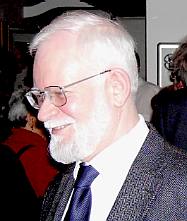 Regular Gates of Vienna readers are familiar with Lars Hedegaard, the writer and columnist for the Danish newspaper Berlingske Tidende. Fjordman has cited his writings several times, and more recently he
Regular Gates of Vienna readers are familiar with Lars Hedegaard, the writer and columnist for the Danish newspaper Berlingske Tidende. Fjordman has cited his writings several times, and more recently he  Well, it does have the characteristics of war. The obstacle for Islam is that today they can’t expand militarily in the more developed West. They could do so in the first Jihad; the Arabic Jihad right after the death of Mohammed. They also could in what we can call the second Jihad, the Turkish or the Ottoman Jihad. In those days they had the opportunity to defeat their enemies with armed might. But that phase of history ended at the end of the 17th century when they couldn’t defeat Europe at Vienna, in 1683. That was the last time they tried. Then there was a retreat by Islam due to an inner collapse of Muslim society. What today is called Jihad is carried out with help of migration, the export of populations, and other methods. There are no armed forces, but there is money… If we take a look at what has happened the last twenty-five years we can see that Saudi Arabian forces have invested almost sixty-five billion dollars for political and ideological influence in the Western world.
Well, it does have the characteristics of war. The obstacle for Islam is that today they can’t expand militarily in the more developed West. They could do so in the first Jihad; the Arabic Jihad right after the death of Mohammed. They also could in what we can call the second Jihad, the Turkish or the Ottoman Jihad. In those days they had the opportunity to defeat their enemies with armed might. But that phase of history ended at the end of the 17th century when they couldn’t defeat Europe at Vienna, in 1683. That was the last time they tried. Then there was a retreat by Islam due to an inner collapse of Muslim society. What today is called Jihad is carried out with help of migration, the export of populations, and other methods. There are no armed forces, but there is money… If we take a look at what has happened the last twenty-five years we can see that Saudi Arabian forces have invested almost sixty-five billion dollars for political and ideological influence in the Western world.
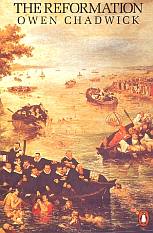 I recently read the book The Reformation by Owen Chadwick, about the Protestant Reformation and the situation in 15th and 16th century Europe. It is fascinating to read about Western Europe during a period when it was genuinely dynamic, not the anemic and self-loathing continent it is now. But still, I was also struck by how many similarities there are between the situation then and now. This was also during a period of Muslim aggression, as the Turks made inroads into the Balkans and Central Europe, eventually threatening even Western Europe.
I recently read the book The Reformation by Owen Chadwick, about the Protestant Reformation and the situation in 15th and 16th century Europe. It is fascinating to read about Western Europe during a period when it was genuinely dynamic, not the anemic and self-loathing continent it is now. But still, I was also struck by how many similarities there are between the situation then and now. This was also during a period of Muslim aggression, as the Turks made inroads into the Balkans and Central Europe, eventually threatening even Western Europe.
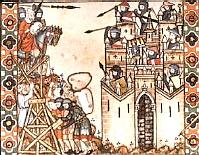 This was during the Second Jihad against the West. Now similar divisions are occurring during the Third Jihad. Not necessarily between countries, but between various cultural and ideological groups within the West.
This was during the Second Jihad against the West. Now similar divisions are occurring during the Third Jihad. Not necessarily between countries, but between various cultural and ideological groups within the West. Some of the Russian skepticism towards the West is understandable. As long as Western nations pander to Muslims, why shouldn’t the Russians do so, too? The reaction of European Union officials to the grotesque Islamic Beslan massacre of Russian school children — all but blaming it on the Russian security forces instead of the Islamic terrorists — rightly upset many Russians.
Some of the Russian skepticism towards the West is understandable. As long as Western nations pander to Muslims, why shouldn’t the Russians do so, too? The reaction of European Union officials to the grotesque Islamic Beslan massacre of Russian school children — all but blaming it on the Russian security forces instead of the Islamic terrorists — rightly upset many Russians. Some of them do. Elena Chudinova, the author of the dystopian novel The Mosque of Notre Dame de Paris, says that if the Muslims were to succeed in establishing their own rule in Moscow, then Russian culture, Russians as a people and Russia itself would cease to exist. And because that danger is not unthinkable, she is calling for a struggle against the Islamic threat to the Christian world.
Some of them do. Elena Chudinova, the author of the dystopian novel The Mosque of Notre Dame de Paris, says that if the Muslims were to succeed in establishing their own rule in Moscow, then Russian culture, Russians as a people and Russia itself would cease to exist. And because that danger is not unthinkable, she is calling for a struggle against the Islamic threat to the Christian world.
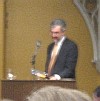
 In his 1968 novel
In his 1968 novel 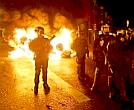 They go by the euphemistic term Zones Urbaines Sensibles, or Sensitive Urban Zones, with the even more antiseptic acronym ZUS, and there are 751 of them as of last count. They are
They go by the euphemistic term Zones Urbaines Sensibles, or Sensitive Urban Zones, with the even more antiseptic acronym ZUS, and there are 751 of them as of last count. They are 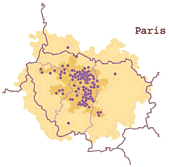 As for the last of these three categories of dysfunction, the phrase Zones Urbaines Sensibles — “Sensitive Urban Zones” — designates the most intractable areas, where the rule of law has vanished and a normal economy no longer functions. They are, as
As for the last of these three categories of dysfunction, the phrase Zones Urbaines Sensibles — “Sensitive Urban Zones” — designates the most intractable areas, where the rule of law has vanished and a normal economy no longer functions. They are, as  Since the 1996 law was passed, additional layers of bureaucratic accretion have been deposited over the original structure. The government has even established an
Since the 1996 law was passed, additional layers of bureaucratic accretion have been deposited over the original structure. The government has even established an  Zaki, a musician in a globalized world, is the provocative new kid on the block. The guy who writes songs so clear and spits them out so loud that his tribute to an album project in Denmark, sending the message of being open-minded and tolerant, was censored!
Zaki, a musician in a globalized world, is the provocative new kid on the block. The guy who writes songs so clear and spits them out so loud that his tribute to an album project in Denmark, sending the message of being open-minded and tolerant, was censored!
 Steen has a
Steen has a  I asked the teenager if he could see the point of the protest. He said, “Yeah, they don’t like the war and they want us to get out of Iraq.” I gave him an A for paying close attention and then pointed out to him the fact that their demonstration would do nothing to help their cause. I explained that the Congressman for this district, Virgil Goode, was widely admired except by voters in Li’l Kumquat. They’d been trying to get him out of office for years.
I asked the teenager if he could see the point of the protest. He said, “Yeah, they don’t like the war and they want us to get out of Iraq.” I gave him an A for paying close attention and then pointed out to him the fact that their demonstration would do nothing to help their cause. I explained that the Congressman for this district, Virgil Goode, was widely admired except by voters in Li’l Kumquat. They’d been trying to get him out of office for years. In searching for the image of yesterday’s (monthly) demonstration in front of Rep. Goode’s office, I came across a tableau we’d encountered last summer. The Baron and I were in Li’l Kumquat attending the art opening of a friend. While there, we saw this group make its slow way down the pedestrian mall — it must be difficult to walk in the late summer heat with a heavy papier maché puppet head covering a third of your body. Evidently their vision was limited as these puppets had to be led along the walkway by others, who held on to them.
In searching for the image of yesterday’s (monthly) demonstration in front of Rep. Goode’s office, I came across a tableau we’d encountered last summer. The Baron and I were in Li’l Kumquat attending the art opening of a friend. While there, we saw this group make its slow way down the pedestrian mall — it must be difficult to walk in the late summer heat with a heavy papier maché puppet head covering a third of your body. Evidently their vision was limited as these puppets had to be led along the walkway by others, who held on to them.
 Over the last year or so Gates of Vienna has gradually become a group effort. After Fjordman came on board our European readership picked up, and people started writing to us from Europe — particularly Scandinavia — with tips, suggestions, and translations of articles from various European media.
Over the last year or so Gates of Vienna has gradually become a group effort. After Fjordman came on board our European readership picked up, and people started writing to us from Europe — particularly Scandinavia — with tips, suggestions, and translations of articles from various European media. Stop the Islamification of Europe (SIOE) is an alliance of people from across Europe with the single aim of preventing Islam from becoming a dominant political force in Europe.
Stop the Islamification of Europe (SIOE) is an alliance of people from across Europe with the single aim of preventing Islam from becoming a dominant political force in Europe.